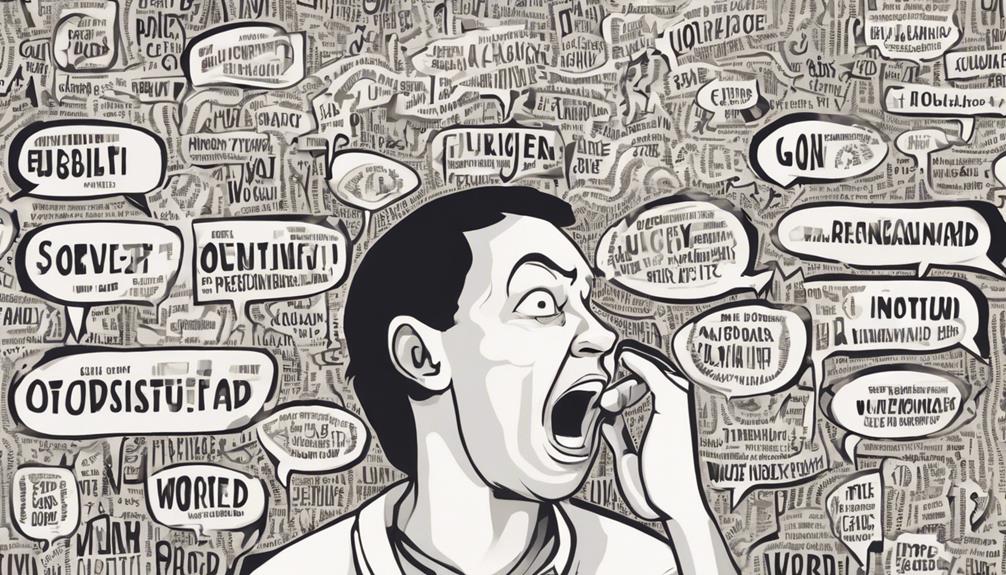When discussing common symptoms of dementia, it is crucial to be aware of key signs related to memory, confusion, communication, mood, behavior, and daily tasks. Memory loss, difficulty recalling recent details, and struggling to find words are early indicators. Challenges with language, disorientation, impaired judgment, and difficulty with abstract thinking typically follow. Be on the lookout for mood swings, changes in personality, and withdrawal from usual activities. Additionally, pay attention to a decline in initiative, difficulties with spatial tasks, problems with movement coordination, and misplacement of objects. These symptoms significantly affect daily life. Continue to explore to enhance your understanding of dementia warning signs.
Key Takeaways
- Memory loss is a common symptom in dementia.
- Confusion and disorientation are prevalent in dementia patients.
- Communication difficulties often arise in individuals with dementia.
- Changes in mood and behavior are frequently observed in dementia.
- Dementia can lead to a loss of ability to perform daily tasks.
Early Cognitive Symptoms
We may notice early cognitive symptoms of dementia through signs like memory loss and challenges in communication. Memory loss, especially with recent information, can be one of the first indicators that something might be important. Forgetting important details or having trouble recalling recent events could signal early cognitive impairment. Understanding symptoms of senior dementia can also involve observing difficulties with problem-solving or completing familiar tasks. For instance, individuals might struggle to follow recipes they’ve known for years or misplace items frequently without being able to retrace their steps. Such changes in behavior and thinking patterns highlight the importance of early recognition and intervention in addressing cognitive decline.
Communication challenges, such as difficulty finding the right words, may also become apparent. This can manifest as struggling to express thoughts clearly or experiencing confusion when trying to hold conversations.
Impaired reasoning abilities, like trouble with problem-solving, are common early symptoms of dementia. Individuals may find it challenging to make decisions or follow logical sequences of tasks. Difficulty concentrating and focusing on daily tasks can also be early signs of cognitive decline. Tasks that were once routine, like following a recipe or managing finances, may become increasingly challenging.
Recognizing these early cognitive symptoms is important for early intervention and support.
Language and Communication Changes

Noticing language and communication changes in individuals with dementia can provide crucial insights into their cognitive health status. Language challenges, such as substituting words in conversations and struggling to find the right words, are common symptoms of dementia. People with dementia may experience word-finding difficulties and have trouble expressing themselves clearly and coherently. These language and communication changes can greatly impact social interactions and daily functioning.
Forgetting simple words and experiencing word-finding difficulties are indicative of language impairment, which can be early signs of cognitive decline associated with dementia. It's important to pay attention to these changes as they can help in identifying dementia symptoms early on. Understanding these language and communication challenges can aid in providing better care and support for individuals with dementia.
Disorientation and Impaired Judgment
Disorientation in dementia often manifests as confusion regarding time, location, and familiar places. This confusion can make it challenging for individuals to understand where they are, what day it is, or how to get back home.
Alongside disorientation, impaired judgment is a common symptom of dementia. It involves making poor decisions, neglecting personal safety, and displaying inappropriate behavior. People with impaired judgment may struggle to recognize health risks or manage their finances effectively.
Tasks that were once routine may become confusing, and the ability to assess consequences may diminish. These symptoms have a substantial impact on daily functioning, making it essential to provide monitoring and support to individuals with dementia.
Abstract Thinking and Misplacement Issues

Abstract thinking difficulties in dementia often present challenges with understanding numbers, symbols, and complex concepts, impacting daily tasks to a significant extent. Individuals with dementia may struggle with managing finances due to impaired judgment, leading to difficulties in budgeting and making appropriate financial decisions. Additionally, abstract thinking issues can manifest in compromised problem-solving skills, affecting the ability to navigate daily life effectively.
These challenges go beyond mere mathematical difficulties; they can also extend to a lack of recognition of health risks. For instance, individuals with dementia-related abstract thinking impairments may not fully grasp the consequences of certain actions, putting their well-being at risk. Understanding abstract concepts and numbers becomes progressively challenging, making it essential for caregivers and loved ones to provide support and guidance in managing these aspects of daily life.
Recognizing and addressing these abstract thinking challenges in dementia is vital for ensuring the overall well-being and safety of individuals affected by this condition.
Mood, Personality, and Behavioral Changes
As we shift our focus to mood, personality, and behavioral changes in individuals with dementia, it becomes evident that these alterations can greatly impact their daily interactions and overall well-being. Mood swings, anxiety, and personality changes are common in dementia, leading to noticeable shifts in behavior. These changes can manifest as irritability, fearfulness, and confusion, affecting how individuals engage with others and handle daily routines.
Specific routines may help manage some of these alterations, but disrupted routines can often trigger irritable behavior and anxiety. Additionally, withdrawal from social activities and hobbies can indicate significant mood and personality changes. It's essential to be patient and understanding when dealing with individuals experiencing these drastic shifts in behavior.
Loss of Initiative and Spatial Challenges

Loss of initiative in dementia can make us feel unmotivated, leading to a lack of interest in activities we once enjoyed.
Spatial challenges, on the other hand, might cause us to struggle with directions and become disoriented in our surroundings.
These difficulties can impact our daily life, making tasks like finding our way in a familiar place or placing objects correctly more challenging.
Lack of Motivation
Experiencing a lack of motivation can greatly impact individuals with dementia, leading to a decline in engagement with once-enjoyed activities. When dealing with lack of motivation in dementia, it's important to understand how it can affect daily life.
- Loss of initiative is common in dementia, causing individuals to lose interest in things they once found enjoyable.
- People with dementia may require cues or reminders to help them engage in everyday tasks due to their lack of motivation.
- Spatial challenges associated with dementia can lead to difficulties with depth perception and spatial awareness, impacting coordination and object placement.
Seeking guidance from medical specialists is essential to address visual and spatial challenges linked to dementia effectively.
Difficulty With Directions
Understanding the difficulties individuals with dementia face in following directions can shed light on the impact of both loss of initiative and spatial challenges on their daily functioning. Spatial challenges in dementia can manifest as issues with depth perception, spatial awareness, and coordinating movements. Individuals may experience placement difficulties, visual impairments, and spatial impairments, making simple tasks like following directions or organizing space challenging. Seeking guidance from medical specialists and eye professionals is essential to address these visual and spatial challenges effectively. These impairments can have a profound effect on daily functioning, making it imperative to provide support and assistance to individuals with dementia in maneuvering their surroundings.
| Spatial Challenges | Impact on Daily Functioning | Seeking Help from Specialists |
|---|---|---|
| Depth Perception | Challenges with tasks | Medical professionals |
| Spatial Awareness | Difficulty in orientation | Eye specialists |
| Coordinating Movements | Struggles with movement | Spatial impairment specialists |
Spatial Disorientation
Performing daily tasks becomes challenging for individuals with dementia due to spatial disorientation affecting their depth perception and spatial awareness. This can lead to difficulties in coordinating movements and placing objects correctly. Vision problems associated with spatial challenges further impact daily activities and safety.
Seeking guidance from medical and eye specialists is essential for diagnosing and managing spatial disorientation in dementia. Additionally, spatial challenges increase the risk of falls and accidents in individuals with dementia.
- Struggling with coordinating movements
- Placing objects incorrectly
- Impact on daily activities and safety
Frequently Asked Questions
What Are the Top 10 Signs of Dementia?
We'll list the top 10 signs of dementia in a concise manner. Our answer will help you recognize warning signs like memory issues, challenges with tasks, communication struggles, disorientation, and impaired judgment, aiding early detection.
What Is the First Stage of Dementia?
In the first stage of dementia, we may notice subtle memory changes, difficulty recalling recent information, forgetting appointments, misplacing items, and struggling with familiar tasks. Seeking early medical evaluation and intervention are essential for managing symptoms.
At What Age Does Dementia Usually Start?
Dementia typically starts after age 65, with risk increasing as we grow older. Factors like genetics, lifestyle, and health can influence onset age. By 85, about 1 in 6 people will have dementia, showing age-related risk.
What Are the 5 Early Signs of Dementia?
We notice difficulty remembering recent information, struggling with familiar tasks, changes in language, disorientation in familiar places, and impaired judgment as early signs of dementia. Recognizing these signs is crucial for proper care.
Conclusion
To wrap up, dementia symptoms can vary widely and impact individuals in different ways. While early cognitive symptoms may manifest subtly, language and communication changes can become more pronounced. Disorientation and impaired judgment can lead to confusion, while abstract thinking and misplacement issues can cause frustration. Mood, personality, and behavioral changes may also occur, along with a loss of initiative and spatial challenges.
Understanding these common symptoms is vital in providing support and care for those affected by dementia.









